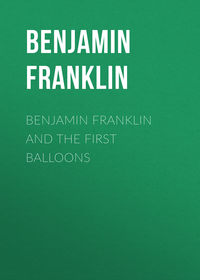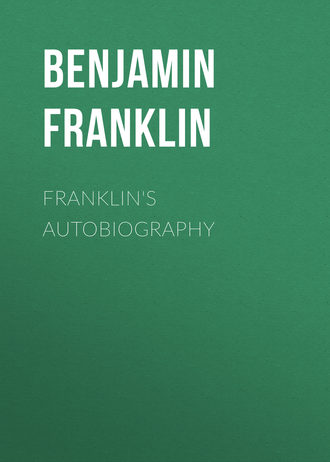 полная версия
полная версияFranklin's Autobiography
"And now, to conclude, Experience keeps a dear school, but fools will learn in no other, as Poor Richard says, and scarce in that; for, it is true, we may give advice, but we cannot give conduct. However, remember this: They that will not be counseled cannot be helped; and further that, If you will not hear Reason, she will surely rap your knuckles, as Poor Richard says."
Thus the old gentleman ended his harangue. The people heard it, and approved the doctrine, and immediately practiced the contrary, just as if it had been a common sermon; for the auction opened and they began to buy extravagantly. I found the good man had thoroughly studied my almanacs, and digested all I had dropped on these topics during the course of twenty-five years. The frequent mention he made of me must have tired any one else; but my vanity was wonderfully delighted with it, though I was conscious that not a tenth part of the wisdom was my own which he ascribed to me, but rather the gleanings that I had made of the sense of all ages and nations. However, I resolved to be the better for the echo of it; and, though I had at first determined to buy stuff for a new coat, I went away resolved to wear my old one a little longer. Reader, if thou wilt do the same, thy profit will be as great as mine. I am, as ever, thine to serve thee,
Richard Saunders.PROVERBS FROM POOR RICHARD'S ALMANAC
The noblest question in the world is, What good may I do in it?
The masterpiece of man is to live to the purpose.
The nearest way to come at glory is to do that for conscience which we do for glory.
Do not do that which you would not have known.
Well done is better than well said.
Who has deceived thee so oft as thyself?
Search others for their virtues, thyself for thy vices.
He that can have patience, can have what he will.
After crosses and losses men grow humbler and wiser.
In a discreet man's mouth a public thing is private.
Wealth is not his that has it, but his that enjoys it.
No better relation than a prudent and faithful friend.
He that can compose himself is wiser than he that composes books.
He that can take rest is greater than he that can take cities.
None but the well-bred man knows how to confess a fault, or acknowledge himself in error.
Read much, but not too many books.
None preaches better than the ant, and she says nothing.
Forewarned, forearmed.
To whom thy secret thou dost tell,To him thy freedom thou dost sell.Don't misinform your doctor or your lawyer.
He that pursues two hens at once, does not catch one and lets the other go.
The worst wheel of the cart makes the most noise.
There are no gains without pains.
If you know how to spend less than you get, you have the philosopher's stone.
Every little makes a mickle.
He that can travel well a-foot keeps a good horse.
He is no clown that drives the plow, but he that doth clownish things.
NOTES AND SUGGESTIONS
Though he did not consider himself a man of letters, Franklin was throughout his long life a writer. His writing was incidental to his business as a journalist and statesman. He also corresponded widely with various classes of people. Fortunately many of these writings have been preserved, and from these and the Autobiography a number of valuable lives have been written. The student will find pleasure in referring to the Franklin volumes of the American Statesmen Series and of the American Men of Letters Series. The three volume life by Mr. John Bigelow and the one volume, The Many-sided Franklin, by Paul Leicester Ford, will supply the years of Franklin's life not included in his autobiography, the writing of which was several times interrupted by public business of the greatest importance, and finally cut short by the long illness that preceded his death.
Read the pages devoted to Franklin in Brander Matthews' Introduction to American Literature. Matthews says of him, "He was the first great American – for Washington was twenty-six years younger." "He was the only man who signed the Declaration of Independence, the Treaty of Alliance with France, the Treaty of Peace with England, and the Constitution under which we still live."
As you read Franklin's pages be on the alert for material to support Mr. Matthews' statement, "Franklin was the first of American humorists, and to this day he has not been surpassed in his own line." Will one of you report to the class on "Franklin's Humor"?
Franklin was far in advance of his times on many questions. In 1783, when concluding the Treaty of Peace with England, he tried to secure the adoption of a clause protecting the property of non-belligerents in subsequent wars. England would not accept this advanced idea, but Frederick II of Prussia agreed to it, and since that time all civilized governments have united in embodying it in the Law of Nations.
Franklin was one of the first and, in proportion to his means, one of the greatest of American philanthropists. He said that he had "a trick for doing a deal of good with a little money." In lending some money to one who had applied to him for assistance, he instructed the borrower to pass it on to some one else in distress as soon as he could afford to repay it. "I hope it may thus go through many hands, before it meets with a knave that will stop its progress."
Mr. Bigelow's Life of Franklin reproduces the philosopher's exact spelling. He was one of the early spelling reformers. See his "Petition of the Letter Z," p. 116, The Many-sided Franklin.
(In the following notes the numerals refer to the pages of the text.)
Page 17. "Ecton, in Northamptonshire." In 1657 George Washington's grandfather emigrated to Virginia from this same English county.
"Franklin, … an order of people." Do you recall one of the titles of Cedric, the Saxon, in Scott's Ivanhoe?
27. Notice his judgment regarding controversy. It will be profitable, from time to time, to consider his remarks as throwing light on the subject, "Franklin, a Manager of Men."
28. Read carefully the paragraph opening with a reference to The Spectator, and using Franklin's method, reproduce that paragraph. Apply this method to other good English selections and try to adapt it to your translations from other languages.
As you read Franklin's account of his self-education, ask yourself what quality it is in the student that gives best assurance of final success in securing a real education.
34. Is Franklin's use of the word "demeaned" good?
37. In his reference to Bunyan and Defoe, Franklin proves himself one of the first critics to recognize those writers as the fathers of the modern novel.
38. "Our acquaintance continued as long as he lived." Few men have placed a higher value on friends than did Franklin. He took the trouble necessary to make friends and to keep them.
61. Read parts of Young's Night Thoughts.
77. Carefully observe the plan of the Junto and its subordinate branches, and consider the value of such organizations for yourself and friends. By referring to Bigelow's Life of Franklin, Vol. I, p, 185, you will find detailed information concerning the rules of the Junto.
81. Years later, while in London in 1773, Franklin showed his ability with his pen and put through a successful journalistic hoax. He published in The Public Advertiser what was for a time accepted by many as an authentic edict of the King of Prussia. In this the king held that the English were German colonists settled in Britain, and that they should be taxed for the benefit of the Prussian coffers.
What claims were the English making in 1773? By looking through other lives of Franklin, you may find an account of another literary hoax by which he helped the American cause.
86. Franklin's original determination to secure money with his wife should be judged by the standards of his time.
89. Beginning with the establishment of the Philadelphia public library, keep a list of Franklin's plans and achievements for the public good.
92. The high honors accorded to Franklin by foreign nations have never been extended to any other American, with the possible exception of Theodore Roosevelt.
111. Franklin's boyhood debate on the subject of the education of young women is reflected here as a settled conviction.
113. The great scholar and historian, Gibbon, agreed with Franklin concerning the languages.
115. "Inoculation." Will you volunteer to make a report to the class on inoculation and vaccination? The two combine in making one of the most interesting chapters in the history of medical science.
117. You will be interested in comparing the constable's watch of ragamuffins with the watch in Shakespeare's Much Ado About Nothing.
118. In many towns and cities there is much of interest connected with the fire department. "The History of Our Fire Department," "Fire Fighting," and many other subjects may suggest themselves to you for written or oral reports. Possibly some one in the class may be able to tell in this connection how Crassus, the friend of Julius Cæsar, gained a great part of his wealth.
119. Have you read of the work of Whitefield and his associates in England? See "The Methodist Movement" in Halleck's History of English Literature, or in some good English history.
132. Your classmates will be interested in a report on the Franklin stove. Make some simple drawings to illustrate its principles.
141. Find out definitely what system of street cleaning prevails in your home town. Write a feature article on that system, as if for a magazine. Some member of the class who has a camera will secure illustrations for you. Also write an editorial for a newspaper, an editorial inspired by the disclosures of the feature article.
175. Will several of you take up the subject of "Franklin's Electrical Experiments" and make reports to the class?
185. Notice Franklin's alertness in suggesting the application of scientific methods to practical affairs. Do you think that Emerson's definition of "genius" as given in the first paragraph of his essay on "Self-Reliance" can be justly applied to Franklin?
You will be interested in following Franklin's experiments in determining the value of oil in stilling the waves, and also his investigations of the Gulf Stream and of the nature of storms. He asked, "What signifies philosophy that does not apply to some use?" Yet he had a wonderful imagination back of his practical nature.
Emerson says that the chief use of a book is to inspire. On this basis how do you rank the Autobiography in usefulness?
ECLECTIC ENGLISH CLASSICS
Addison's Sir Roger de Coverley Papers (Underwood)
Arnold's Sohrab and Rustum (Tanner)
Bunyan's Pilgrim's Progress (Jones and Arnold)
Burke's Conciliation with America (Clark)
Speeches at Bristol (Bergin)
Burns's Poems – Selections (Venable)
Byron's Childe Harold (Canto IV), Prisoner of Chillon, Mazeppa, and other Selections (Venable)
Carlyle's Essay on Burns (Miller)
Chaucer's Prologue and Knighte's Tale (Van Dyke)
Coleridge's Rime of the Ancient Mariner (Garrigues)
Cooper's Pilot (Watrous)
The Spy (Barnes)
Defoe's History of the Plague in London (Syle)
Robinson Crusoe (Stephens)
De Quincey's Revolt of the Tartars
Dickens's Christmas Carol and Cricket on the Hearth (Wannamaker)
Tale of Two Cities (Pearce)
Dryden's Palamon and Arcite (Bates)
Eliot's Silas Marner (McKitrick)
Emerson's American Scholar, Self-Reliance, Compensation (Smith)
Franklin's Autobiography (Reid)
Goldsmith's Vicar of Wakefield (Hansen)
Deserted Village (See Gray's Elegy)
Gray's Elegy in a Country Churchyard, and Goldsmith's Deserted Village (Van Dyke)
Hughes's Tom Brown's School Days (Gosling).
Irving's Sketch Book – Selections (St. John)
Tales of a Traveler (Rutland)
Lincoln's Addresses and Letters (Moores)
Address at Cooper Union (See Macaulay's Speeches on Copyright)
Macaulay's Essay on Addison (Matthews)
Essay on Milton (Mead)
Essays on Lord Clive and Warren Hastings (Holmes)
Lays of Ancient Rome and other Poems (Atkinson)
Life of Johnson (Lucas)
Speeches on Copyright, and Lincoln's Address at Cooper Union (Pittenger)
Milton's L'Allegro, Il Penseroso, Comus, Lycidas (Buck)
Paradise Lost. Books I and II (Stephens)
Old Ballads (Morton).
Old Testament Narratives (Baldwin)
Poe's Selected Poems and Tales (Stott)
Pope's Homer's Iliad. Books I, VI, XXII, and XXIV Rape of the Lock and Essay on Man (Van Dyke)
Ruskin's Sesame and Lilies (Rounds)
Scott's Abbot
Ivanhoe (Schreiber)
Lady of the Lake (Bacon)
Marmion (Coblentz)
Quentin Durward (Norris)
Woodstock
Shakespeare's As You Like It (North)
Hamlet (Shower)
Henry V (Law)
Julius Cæsar (Baker)
Macbeth (Livengood)
Merchant of Venice (Blakely)
Midsummer Night's Bream (Haney)
The Tempest (Barley)
Twelfth Night (Weld)
Southey's Life of Nelson
Stevenson's Inland Voyage and Travels with a Donkey (Armstrong)
Treasure Island (Fairley)
Swift's Gulliver's Travels (Gaston)
Tennyson's Idylls of the King – Selections (Willard)
Princess (Shryock)
Thackeray's Henry Esmond (Bissell)
Washington's Farewell Address, and Webster's First Bunker Hill Oration (Lewis)
Webster's Bunker Hill Orations (See also Washington's Farewell Address)
Wordsworth's Poems – Selections (Venable)
1
See pp. 198–206.
2
The time of Braddock's defeat.
3
When the old duties "upon all rum, spirits, molasses, syrups, sugar," etc., were renewed, and extended to other articles.
4
A village near Winchester, Hampshire, England, where Dr. Jonathan Shipley had his country house. Dr. Shipley was Bishop of St. Asaph's in Wales, and Franklin's friend.
5
Franklin's only living son, William, who in 1762 had been made royal governor of New Jersey, with the hope of detaching Franklin from the cause of the colonists.
6
A franklin was a freeman, or freeholder, or owner of the land on which he dwelt. The franklins were by their possessions fitted for becoming sheriffs, knights, etc. After the Norman Conquest, men in England took, in addition to the first name, another which was suggested by their condition in life, their trade, or some personal peculiarity. See Note, p. 203.
7
A title given in England in Franklin's time to the descendants of knights and noblemen.
8
A writer whose duties were similar to those of our notary.
9
"Old style," i.e., the method of reckoning time which formerly prevailed and which had caused an error of eleven days. The new style of reckoning was adopted in England in 1752.
10
The passage of the soul into another body; one might have supposed that the soul of the uncle had taken up abode in Franklin's body.
11
Franklin omitted the verses.
12
Who was queen from 1553 to 1558.
13
"Joint stool," i.e., a stool made of parts fitted together.
14
"Outed for nonconformity," i.e., turned out of the church for not conforming to the usages of the Church of England and for holding meetings of dissenters for public worship.
15
Franklin was born Sunday, Jan. 17, 1706 (Jan. 6, old style). The family then lived in a small house on Milk Street, near the Old South Church, where the Boston Post building now stands.
16
The persecution which the first settlers practiced against all who differed with them in religious doctrines.
17
Sherburne is now called Nantucket.
18
The lines which Dr. Franklin had forgotten are these:
"I am for peace and not for war,And that's the reason whyI write more plain than some men do,That used to daub and lie.But I shall cease, and set my nameTo what I here insert,Because to be a libelerI hate it with my heart."19
In Franklin's time the grammar school was a school for teaching Latin, which was begun by committing the grammar to memory.
20
Characters, or method of writing shorthand.
21
Candles were made by dipping wicks in the fat a number of times, and also by setting the wicks in a mold and pouring the fat round them.
22
Ants.
23
The marble having crumbled, a larger stone was placed over the grave in 1827, and Franklin's inscription repeated. It stands in the Granary Burying Ground.
24
Aged.
25
A joiner is a mechanic who does the woodwork of houses, etc.; a turner, one who works with a lathe; a brasier, a worker in brass.
26
A chapman was a peddler.
27
Agreements written upon sheets, the edges of which were cut or indented to match each other, for security and identification.
28
A street in London in which many writers of small ability or reputation, or of unhappy fortune, had lodgings. "Grub Street style," therefore, means poor or worthless in literary value. The term, which always implied a sneer, was made current by Pope and Swift and their coterie.
29
A paper published in London every week day from the 1st of March, 1711, to the 6th of December, 1712, and made up for the most part of essays by Addison, Steele, and their friends. It held aloof from politics, and dealt with the manners of the time and with literature.
30
These gentlemen of Port Royal lived in the old convent of Port Royal des Champs, near Paris. They were learned men who, with other works, prepared schoolbooks, among which was the "Art of Thinking," a logic.
31
"The Socratic method," i.e., the method of modest questioning, which Socrates used with pupils and opponents alike, and by which he led them to concessions and unforeseen conclusions.
32
These lines are not Pope's, but Lord Roscommon's, slightly modified.
33
"The New England Courant was the fourth newspaper that appeared in America. The first number of the Boston News-Letter was published April 24, 1704. This was the first newspaper in America. The Boston Gazette commenced Dec. 21, 1719; the American Weekly Mercury, at Philadelphia, Dec. 22, 1719; the New England Courant, Aug. 21, 1721. Dr. Franklin's error of memory probably originated in the circumstance of his brother having been the printer of the Boston Gazette when it was first established. This was the second newspaper published in America." – Sparks.
34
Told.
35
Lowered; put down. [n]
36
The legislature.
37
Errors; mistakes.
38
Kill von Kull, the strait between Staten Island and New Jersey.
39
That is, John Bunyan, the author of the book.
40
In New Jersey.
41
Learning.
42
English penny pieces. The coin money used by the colonists was at this time of foreign make.
43
This market stood on the southwest corner of Second and Market Streets.
44
A composing stick is a small tray which the compositor holds in his left hand and in which he arranges the type that he picks out of the cases with his right hand.
45
A false reasoner, and hence a deceiver.
46
The name of a kind of type.
47
Manuscript or printing of original matter.
48
Boarded.
49
The Camisards, who broke away from the state religion of France, and suffered persecution at the hands of Louis XIV. They showed their spiritual zeal by the prophetic mania and by working miracles, as well as by a stout attachment to their creed.
50
"Both governments," i.e., both Pennsylvania and Delaware.
51
Peep show.
52
"Piece of eight," i.e., the Spanish dollar, containing eight reals. The present value of a real is about five cents.
53
The seats across the boat on which the oarsmen sit.
54
For Governor Keith's character and popularity, see p. 58.
55
Captain Annis, commander of the ship, is here referred to.
56
Entrapped.
57
Lev. xix. 27.
58
An agent or commission merchant.
59
In 1728 Alexander Pope published his Dunciad, and in Book III. lines 165, 166, he refers to Ralph, who was then living in London:
"Silence, ye wolves! while Ralph to Cynthia howls.And makes night hideous – answer him, ye owls!"Later, his History of England during the Reigns of King William, Queen Anne, and King George I. was highly praised (see pp. 177, 178).
60
Responsible for the payment of a note.
61
The owners or proprietors of Pennsylvania, which Charles II. had given William Penn, were Penn's sons. They lived in England.
62
A street in London.
63
A pistole was a Spanish gold coin worth about four dollars.
64
A comedian of some note.
65
A hackney writer, or hack writer, is one employed to write according to direction.
66
Inns of Court in London, occupied by lawyers.
67
Setting type.
68
A celebrated physician and naturalist. To him Franklin wrote:
"Sir: Having lately been in the northern parts of America, I have brought from thence a purse made of the asbestos, … called by the inhabitants 'salamander cotton.' As you are noted to be a lover of curiosities, I have informed you of this; and if you have any inclination to purchase or see it, let me know your pleasure by a line for me at the Golden Fan, Little Britain, and I will wait upon you with it. I am, sir, your most humble servant,


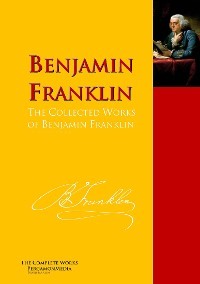
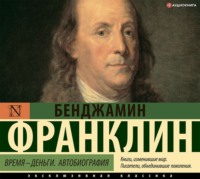
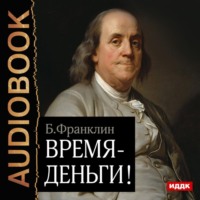
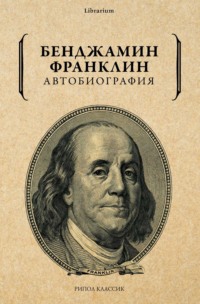
![Memoirs of Benjamin Franklin; Written by Himself. [Vol. 2 of 2]](/covers_200/24858395.jpg)
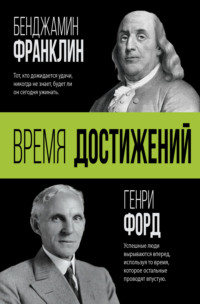
![Memoirs of Benjamin Franklin; Written by Himself. [Vol. 1 of 2]](/covers_200/24858139.jpg)
